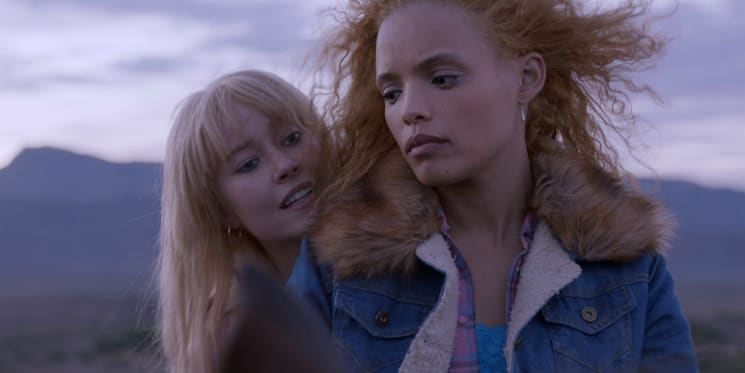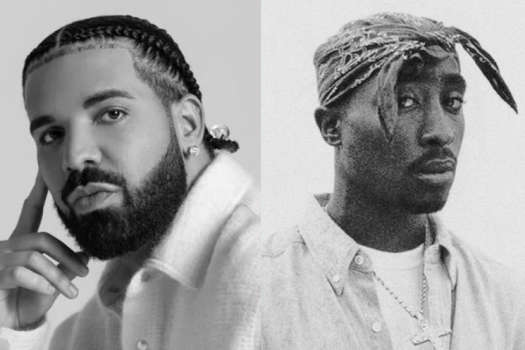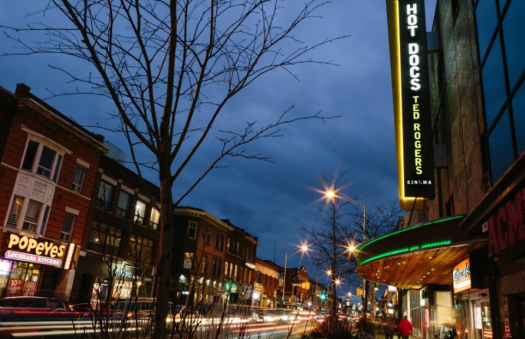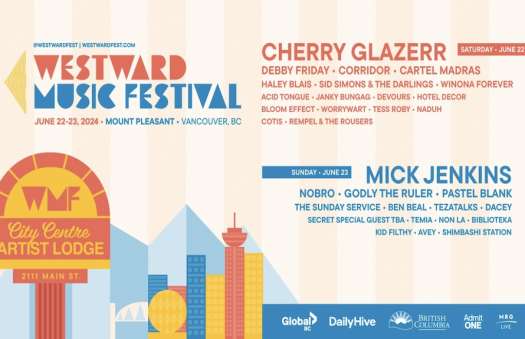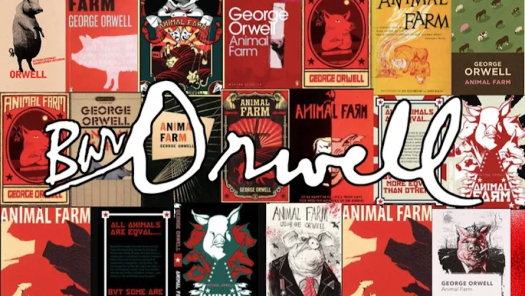Written and directed by Jenna Cato Bass, Flatland is set in the hostile frontier of South Africa and follows three women who become connected through their equally trapped lives. The film's narrative follows all three as they travel across this bleak, well, flatland, two trying to escape the past while the other is stuck in it. It's the film's central metaphor, posing the question of what it means to be a woman in today's chaotic world.
"God's plan," a notion referred to in Flatland's opening frames, provides a fatalistic motif that reinforces repression, endless cycles of convention and male dominance. This is emphasized on Natalie's wedding day, a supposedly joyous day that, through Nicole Fortuin's powerful performance, makes the unhappiness behind her eyes plain to see. She was raised in a backwards society that determines her fate; as a black woman, she was raised to be married, while her white sister was given an education. Natalie is supposed to be dependent on her white husband, but it's not the life she wants. She wants to be free, and it provides the film's central thrust.
That freedom ultimately comes with the sound of a gunshot. "You don't understand how long I've waited for something real to happen," she says. But her destructive decisions, while not only allowing her to free herself, also inadvertently affect the lives of the two other women in this story.
Beauty (Faith Baloyi) is a cop who wishes her life was like the soap opera she falls asleep to, but she's stuck in the past, unwilling to let go of her fiancée, Billy (Brendon Daniels), who's been in jail for 15 years. He's been accused of killing a man, but Beauty knows he's innocent, and her investigation leads to suspect Natalie, who's now on the run with her sister Poppie (Izel Bezuidenhout).
Natalie and Poppie may not be sisters by blood, but they grew up together and are bound by the relationship Poppie had with Natalie's mother. Trapped like Natalie, Poppie is pregnant from a man she rarely sees, has no job despite her good education and is kept cooped up by the aunt she lives with. But her reunion with Natalie gives her a taste of freedom, which leads to the best sequence of the film: a Thelma and Louise-esque picture of them riding against the wind on horseback.
Flatland becomes an exploration of this newfound freedom in a world that is too dangerous for them, full of greedy, ego-driven men, where alcohol and drugs are rampant and law are made to be broken. It's also a world of immense racism and objectification. Tensions rise between Poppie and Natalie in this tense new environment, making for a gripping third act as all three women face off against those who have kept them oppressed.
While Flatland does take some uncomfortable turns and makes some jarring editing and directorial choices, it's also thought-provoking and captivating, thanks to its strong cast of women. Through them, we see how hard it is to chase what we want, but how satisfying it is once we get there.
(Proper Film / Deal Productions / IGC Films / unafilm GmbH)"God's plan," a notion referred to in Flatland's opening frames, provides a fatalistic motif that reinforces repression, endless cycles of convention and male dominance. This is emphasized on Natalie's wedding day, a supposedly joyous day that, through Nicole Fortuin's powerful performance, makes the unhappiness behind her eyes plain to see. She was raised in a backwards society that determines her fate; as a black woman, she was raised to be married, while her white sister was given an education. Natalie is supposed to be dependent on her white husband, but it's not the life she wants. She wants to be free, and it provides the film's central thrust.
That freedom ultimately comes with the sound of a gunshot. "You don't understand how long I've waited for something real to happen," she says. But her destructive decisions, while not only allowing her to free herself, also inadvertently affect the lives of the two other women in this story.
Beauty (Faith Baloyi) is a cop who wishes her life was like the soap opera she falls asleep to, but she's stuck in the past, unwilling to let go of her fiancée, Billy (Brendon Daniels), who's been in jail for 15 years. He's been accused of killing a man, but Beauty knows he's innocent, and her investigation leads to suspect Natalie, who's now on the run with her sister Poppie (Izel Bezuidenhout).
Natalie and Poppie may not be sisters by blood, but they grew up together and are bound by the relationship Poppie had with Natalie's mother. Trapped like Natalie, Poppie is pregnant from a man she rarely sees, has no job despite her good education and is kept cooped up by the aunt she lives with. But her reunion with Natalie gives her a taste of freedom, which leads to the best sequence of the film: a Thelma and Louise-esque picture of them riding against the wind on horseback.
Flatland becomes an exploration of this newfound freedom in a world that is too dangerous for them, full of greedy, ego-driven men, where alcohol and drugs are rampant and law are made to be broken. It's also a world of immense racism and objectification. Tensions rise between Poppie and Natalie in this tense new environment, making for a gripping third act as all three women face off against those who have kept them oppressed.
While Flatland does take some uncomfortable turns and makes some jarring editing and directorial choices, it's also thought-provoking and captivating, thanks to its strong cast of women. Through them, we see how hard it is to chase what we want, but how satisfying it is once we get there.
